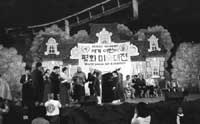|
|
||||
|
Korea: NGO proposals for the 21st century |
||||
|
By Isthar D.-Adler Under the slogan “Inspire, Empower, Act!”, hundreds of organisations and thousands of global citizens gathered together from East to West, in Seoul, Korea, from the 10th to the 15th of October, to discuss the role of NGOs in the 21st century. Jointly organised by the Conference of NGOs in Consultative Relationship with the United Nations, the Executive Committe of NGOs associated with the Department of Public Information of the United Nations (NGO/DPI Executive Committee), and the Global Cooperation Society (GSC) International/Kyung Hee University, the goals of this historic conference were to assess the commitments made by governments at UN world conferences of the 1990s, to forge a common vision for the 21st century and organise collective energy and experience to make this vision a reality: engage in policy dialogue with the UN and government agencies, with an opportunity for enhanced communication and collaboration among diverse grouping of NGOs; build networks for more effective implementation of NGO activities in support of the conference recommendations. The conference, attended by some 7000 participants ended its five day programme at Seoul’s Olympic Park with the presentation of the “Seoul NGO Millennium Declaration” pledging to work together towards creating “a world that is more human centered and genuinely democratic”, further stating “our vision is of a world where the driving forces of all societies are justice, equality, dignity and respect for diversity and the human rights of all people”. The conference closed with celebratory speeches by conference organisers, including Choue Young-Seek, Elaine Valdov and Afaf Mahfouz who said “we cannot stress enough the important role that NGOs play in creating a world of peace which is why gatherings like this are so crucial, so that we can share with each other both our experiences and motivations. President Hugo Chavez of Venezuela delivered a speech on the significance of NGOs in the movement for world democracy and Korea’s First Lady, honorary chair of the conference, said “through this conference we were able to establish that the coming century will truly be an age of NGOs; that no fundamental solution in any human affair will be possible without citizen or NGO participation. In conclusion, Mairead Maguire, Nobel Peace Prize laureate, launched the “International Decade of Peace and Non-Violence for the children of the world”. Some 200 workshops were held during the five day conference: Thanking the people of the Republic of Korea and the organisers of the 1999 Seoul International Conference of NGOs, whose humanitarian motivation is invaluable for the development of the work of NGOs worldwide, T.Y.S. Lama Gangchen began the workshop on the creation of a permanent United Nations Spiritual Forum for World Peace by inviting all those present to contribute a prayer for world peace according to their own spiritual tradition, (including Korean, Teravada and Mahayana Buddhist, Catholic, Christian, Hinduist, Islam and Jewish). With the wish for all spiritual and religious organisations and initiatives working towards the common aim of developing a culture of peace, T.Y.S. Lama Gangchen, initiator of the proposal, spoke of the importance of breaking through the “glass ceiling” which had been isolating religious and spiritual leaders from contributing actively to the work of the United Nations in its endeavour to bring about world peace. The spiritual forum, he continued, would give a voice to all spiritual and religious communities at international level, and recognising the spiritual dimension would be immensely empowering for the United Nations. Since the original proposal was launched in June 1995, at ECLAC in Santiago, Chile, support for its creation had grown widely throughout the world at all levels, with some 10’000 copies of the proposal’s five year illustrated report printed and distributed worldwide. H.E. Shah Sufi M.N. Alam, founder president of the World Spiritual Assembly, USA, giving his organisation’s full support, said it was time to discuss the issue and implement this project, putting it on their immediate agenda for action. H.E. M.N. Alam, in serving the cause of neglected humanity, looks after more than 100 educational institutions - high schools, colleges, vocational training centers, madrahas, mosques, as well as 15 orphanages housing several hundred parentless children in Bangladesh. His organisation: the Dayemi Complex Bangladesh was designated as a United Nations Peace Messenger Organisation by the UN Secretary General in 1986. At the conclusion of the workshop it was further decided to form a special International Advisory Committee for the creation of a United Nations Spiritual Forum for World Peace in New York, proposing H.E. M.N. Alam as its chairman. Maureen Chen, Brahma Kumaris, Hong Kong, emphasised the need for more “saintly” solutions to the problems and tragedies facing our world today, in order to find the courage to “forgive”; that such a spiritual forum would raise its status and make spirituality legitimate and therefore fill such a need by working from a higher consciousness; she was echoed by Boaz Fyler, International Institute of Integral Human Sciences, Israel, who said “saintly behaviour is just a higher form of humanity, and therefore within our reach”. Enriched by the distinguished presence of Venerable Kim Sang Beak, president, Korea Youth Buddhist Federation, the discussion focussed upon the importance of bringing youth into the picture to develop the concept. T.Y.S. Lama Gangchen, answering a young participant’s question, emphasised the importance of inner peace as the very basis for world peace, a message found in all spiritual and religious traditions and truly the “best investment” for future generations. Monica Sharma, Unicef, Nepal, said indeed inner peace was the common language which reinforces the need for us to look more closely at its deeper meaning. T.Y.S. Lama Gangchen invited all spiritual and religious leaders, individuals who remember their spiritual nature, and all interested persons, to participate in a spiritual forum dedicated to building the Culture of Peace for the 21st century by supporting all efforts which inherently unify diverse thinking to effect positive values for the betterment of all life, and have the various spiritual perspectives included in discussion and decision making on all world issues. The message is clear, nature already tells us that we must come into balance to preserve the abundance of the web of life on this planet; the spiritual perspective must have a formal recognition at the United Nations as an important key to further a new culture of peace. It is therefore recommended that a permanent spiritual forum be established of willing individuals who come to the United Nations in altruistic service for a common humanity. This forum is an open invitation for dialogue and experiential learning focusing on the understanding that spirit permeates all ideas and resolutions. Meanwhile, on October 21st at UN headquarters in New York, “The spiritual work of the United Nations: Building a Planetary Consciousness” conference was being held to discuss the organisational evolution of such a forum. Keynote presentations were made by Alfredo Sfeir-Younis, World Bank Representative to the UN; Deborah Moldow, World Peace Prayer Society Exec. Director; Luciano Meira, Legion of Goodwill Exec. Director. There then followed group discussions on how planetary consciousness can be more fully cultivated and expressed within the UN, as well as discussing what immediate steps can be taken to create such a forum. Fifty thousand children, aged between five and eighteen sent in their drawings to the world peace art competition, organised by the International Association of Educators for World Peace’s Korea Chancellor, Mr Lee Jon-Young, publisher of the UN News, as a contribution to the United Nations’s mission of peace. The entries were put on exhibit in Seoul, where some 200 Korean children received their prize and a certificate printed with a special message from the Secretary General of the United Nations Kofi Annan, from the hands of IAEWP president Dr Charles Mercieca and special guests. |
||||
|
|
||||




